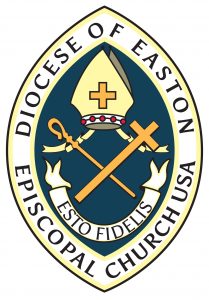Collaborative Clergy Conference
Two- Diocese & One Convocation Gathered Together
Reimagining Our Common Life as the Body of Christ”
“See I am making all things new.” (Revelation 21: 5)
“…they may be one, as we are one…” (John 17: 22)
The Diocese of Easton, guided by the Holy Spirit, pioneered a unique opportunity this week (May 10-11) by organizing and executing a Two-Diocese & One Convocation Clergy Conference, the first of its kind. The Diocese collaborated with the Episcopal Church in Delaware and the Convocation of Episcopal Churches in Europe to engage clergy from the three Episcopal judicatories in common conversation. It was the body of Christ utilizing a new model of doing the church’s business – bridging virtual space via Zoom. The Convocation of Episcopal Churches in Europe is comprised of Episcopal churches/missions in Germany, Italy, Belgium, France, Georgia, Switzerland and Austria.
The Clergy Conference was attended by over 90 clergy from the participating dioceses and convocation. Worship was led by the three judicatories and gave clergy the rare opportunity to experience the vision of a pre-Pentecost worship experience. According to Bishop San, “This was one the many highlights of the two-day conference. It was an extremely holy and spiritually compelling moment of grace and mystery. A reaffirming testament of how fortunate and blessed we are to be a part of this beloved church.”
The designers of the conference were intentional to avoid a didactic formula and opted for a format that would offer more opportunity for conversation in breakout rooms, allowing for development of community, sharing of experiential resources, and supporting and reinforcing our common mission and trust in God to preserve the vision of the church. The pandemic has presented a particular subset of difficulties to those who are, by nature or calling, caregivers – including clergy. With this in mind, the three bishops were desirous of giving their clergy time and space to spend time with each other in healthy conversation. One clergy remarked that this conference was, “very therapeutic and reassuring; a reminder that our health and wellness is a top priority of our pastoral leaders”.
The Right Reverend Mark Edington, Bishop-in-Charge of the Convocation of Episcopal Churches in Europe, acted as keynote and facilitator of the two-day Conference. The conversation was based around the conference theme – “We Shall be Changed: Questions for the Post-Pandemic Church,” also the title of Bishop Edington’s recently released book. The book is a collection of essays written by renowned leaders in the Episcopal Church and beyond, collected and edited by Bishop Edington to help the wider church grapple with what’s next.
This conference amounted to what Bishop San has termed, “a microcosm of the United Nations, engaging in holy conversation around navigating the global pandemic.” It provided for the sharing of challenges, anxieties, fears, apprehensions – and opportunities – that this pandemic has offered. Many powerful testimonies were shared. It is patently obvious that one of the unintended consequences of COVID-19 is to force the world and the church to think ‘outside the box’. Adaptability, creativity, ingenuity, versatility, and technological learnings are some of the gifts the church continues to harness from this time. The conference highlighted the many unique and ingenious ways our colleagues and our clergy are skillfully and fruitfully employing these gifts for effective pastoral care and mission and ministry. Bishop San was visibly emotional when he mentioned how grateful he was and is of the clergy of the diocese and acknowledges the fact that this pandemic has had a tough toll on their health and well-being – reminiscing on how proud and grateful he is for each of them and of their ministry in the diocese.
The diocese is eagerly looking forward to the fruitfulness of the conference and how much it will assist in mapping the way forward in our long-term diocesan wide strategy for the post-pandemic church. Associated with this is navigating the design of the hybrid church model many of the contributors were advocating. Be assured that the Hybrid model, if the diocese chooses to embrace the model as germane to our future life post-pandemic, will be complimentary to our current ecclesiology, rather than a supplementary model. Bishop San hopes that the clergy conference offered clergy some resources that could help guide parish’s discussions on the ten questions posed in his convention address.

